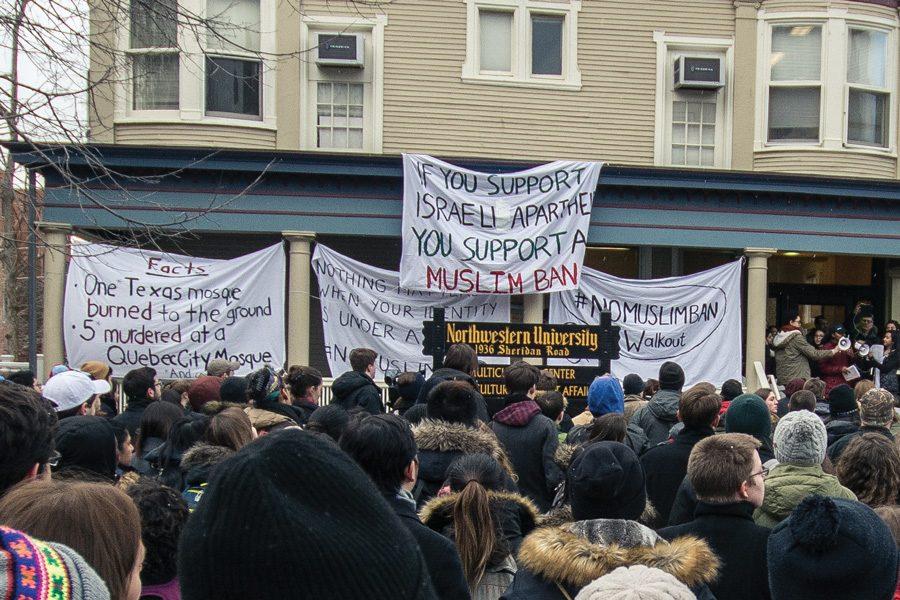Schapiro responds to debate over travel ban protest banner
Protesters gather outside of the Multicultural Center for a demonstration against President Donald Trump’s executive order barring citizens of seven Muslim-majority countries from entering the country. University President Morton Schapiro said it is important to focus on Muslim voices regarding the protest and not to be distracted by other conversations.
February 16, 2017
University President Morton Schapiro told The Daily on Wednesday that listening to Muslim voices should be a priority, following controversy over a recent campus demonstration protesting President Donald Trump’s executive order on immigration.
During the “#NoMuslimBan Walkout,” a Feb. 1 demonstration protesting the order temporarily barring citizens of seven Muslim-majority countries from entering the country, organizers hung a banner reading, “If you support Israeli apartheid, you support a Muslim ban.” The event — one of several protests against the executive order from students, faculty and staff — prompted criticism from some, including Prof. Mark Sheldon, who wrote a letter to the editor published in The Daily questioning the use of the banner.
Schapiro said he received feedback after the protest taking offense at the banner and critiquing its usage. He said he recognized the need for dialogue on issues such as Israel and Palestine and that he understood people’s frustrations with the banner, but added that it is still important to focus on voices of those who were targeted by the order, which is currently blocked in court.
“The group that’s under attack right now — and the real question about their position in the country going forward — is Muslims. It’s not Jews in this country,” Schapiro said. “I don’t think it’s the time to change that dialogue.”
Organizers of the protest rolled out the banner after the event had begun, a move Sheldon criticized in his letter as appearing to be “deception and co-option,” leading to “an opportunity for a single-minded full-throated condemnation of President Donald Trump and his administration by the full Northwestern community (to be) sadly squandered.”
“It seems to me that the group who organized the demonstration deceived the Northwestern community,” Sheldon wrote. “The demonstration was presented as a response to the Trump administration’s action, not to Prime Minister Benjamin Netanyahu’s administration.”
Weinberg senior Ajay Nadig responded to Sheldon in another letter to the editor published in The Daily that the banner demonstrated an intersection of issues at the core of the protest. Nadig wrote it is important not to enter a protest and “take the fruits of their labor and then attack a core aspect of their movement.”
Naib Mian, vice president of IJP and one of the organizers of the protest, said it was “disingenuous” to express outrage at a ban in the United States directed largely toward Muslims, but to “defend a similar ban if those Muslims happen to be Palestinian and the enforcer is Israel.”
Though Mian agreed with Schapiro’s sentiment expressing the need to focus on Muslim voices, he stressed that Israel and Palestine are not a separate issue from the executive order.
“We were trying to highlight Muslim voices, and a lot of Muslim voices happen to be Palestinian,” the Medill senior said. “A lot of Palestinian voices happen to be Muslim.”
In response to Schapiro’s remarks, Sheldon’s only comment was, “OK, let him say whatever he wants.”
This story was updated on Sunday with a complete quote from Naib Mian.
Email: [email protected]
Twitter: @matthewchoi2018


